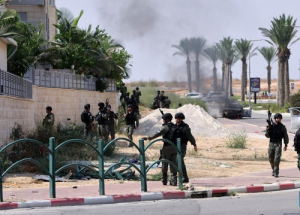World
Red Cross Facilitates Hostage Transfer Amid Israel-Hamas Truce

The International Committee of the Red Cross (ICRC) has begun transferring hostages as part of a ceasefire agreement between Israel and Hamas, marking a significant development in the ongoing conflict. On Monday, the Israeli military confirmed that the Red Cross was en route to a location in the southern Gaza Strip to take custody of the second group of living hostages. This follows the return of seven hostages to Israel earlier in the day, the first to be freed under the newly established truce.
The release of the first seven hostages occurred after two years of intense conflict, which has severely impacted the Gaza Strip. Families and friends of the hostages celebrated as Israeli television reported the successful transfer to the Red Cross, with many gathering in public locations across the country to witness the event. The situation has drawn significant attention, with tens of thousands of Israelis tuning in to public screenings, particularly in Tel Aviv.
Hamas has stated its intention to exchange a total of 20 living hostages for over 1,900 Palestinian prisoners currently held by Israel. The families of those freed were filled with joy, though there has been no immediate update on the condition of the hostages. The humanitarian implications of the truce are profound, as it is expected to facilitate a surge in aid to the famine-stricken region of Gaza, where hundreds of thousands are homeless.
The ongoing conflict has seen its deadliest moments since Hamas’s surprise attack on Israel on October 7, 2023, which resulted in approximately 1,200 deaths and the capture of 250 individuals. Since then, Israeli forces have responded with extensive military operations, leading to a reported death toll of over 67,000 Palestinians, according to the Gaza Health Ministry. This figure highlights the devastating consequences of the ongoing violence, with many civilians caught in the crossfire.
Impact of the Truce and Future Considerations
The recent hostages’ return signifies a crucial step towards ending a war that has escalated tensions and humanitarian crises in the region. Under heavy international pressure, both parties agreed to a ceasefire last week, which has shifted the dynamics of the conflict. With the release of the hostages, many Israelis hope for a resolution to the ongoing violence, although the future of both Hamas and governance in Gaza remains uncertain.
The Israeli military confirmed the freed hostages will be taken to the Reim military base to reunite with their families. However, it is unlikely that the remains of up to 28 other missing hostages will be returned simultaneously. An international task force has been established to locate deceased hostages not returned within 72 hours.
The timing of the release of Palestinian prisoners has not yet been disclosed. The group includes individuals serving life sentences for attacks on Israelis and others held without charge. Concerns have been raised regarding potential celebrations in the West Bank, with Israeli authorities warning against public displays of joy.
U.S. President Donald Trump, who is visiting the region, is expected to address the hostage situation and support the ceasefire efforts. Trump is scheduled to meet with families of the hostages and speak at the Knesset, Israel’s parliament. Following his visit to Israel, he will continue to Egypt for a peace summit alongside regional leaders, including Mahmoud Abbas, the leader of the Palestinian Authority.
Humanitarian Crisis and Future Governance
The humanitarian situation in Gaza is dire, with the United Nations estimating that Israel has approved the entry of 190,000 metric tons of aid. This figure is set to increase, with an expected flow of around 600 trucks per day, as outlined in the ceasefire agreement. UN humanitarian chief Tom Fletcher has described much of Gaza as a wasteland, emphasizing the urgent need for basic medical services and food supplies.
As the conflict continues, discussions about the future governance of Gaza remain unresolved. Israel is advocating for the disarmament of Hamas and is wary of any role for Abbas’s Palestinian Authority in post-war reconstruction. The U.S. proposes an international body to oversee Gaza, with a focus on Palestinian technocrats managing daily affairs.
The future of Gaza and its residents hangs in the balance, as regional and international leaders work towards a comprehensive peace plan. The prospect of a billion-dollar reconstruction process adds further complexity, with Israel and Hamas holding fundamentally different views on governance and security.
As the situation develops, the international community is closely monitoring the truce’s effectiveness and the potential for a sustainable peace in the region. The humanitarian needs of Gaza’s residents remain a pressing concern, as the toll of two years of conflict continues to weigh heavily on both sides.
-

 World5 months ago
World5 months agoSBI Announces QIP Floor Price at ₹811.05 Per Share
-

 Lifestyle5 months ago
Lifestyle5 months agoCept Unveils ₹3.1 Crore Urban Mobility Plan for Sustainable Growth
-

 Science4 months ago
Science4 months agoNew Blood Group Discovered in South Indian Woman at Rotary Centre
-

 World5 months ago
World5 months agoTorrential Rains Cause Flash Flooding in New York and New Jersey
-

 Top Stories5 months ago
Top Stories5 months agoKonkani Cultural Organisation to Host Pearl Jubilee in Abu Dhabi
-

 Sports4 months ago
Sports4 months agoBroad Advocates for Bowling Change Ahead of Final Test Against India
-

 Science5 months ago
Science5 months agoNothing Headphone 1 Review: A Bold Contender in Audio Design
-

 Top Stories5 months ago
Top Stories5 months agoAir India Crash Investigation Highlights Boeing Fuel Switch Concerns
-

 Business5 months ago
Business5 months agoIndian Stock Market Rebounds: Sensex and Nifty Rise After Four-Day Decline
-

 Sports4 months ago
Sports4 months agoCristian Totti Retires at 19: Pressure of Fame Takes Toll
-

 Politics5 months ago
Politics5 months agoAbandoned Doberman Finds New Home After Journey to Prague
-

 Top Stories5 months ago
Top Stories5 months agoPatna Bank Manager Abhishek Varun Found Dead in Well









